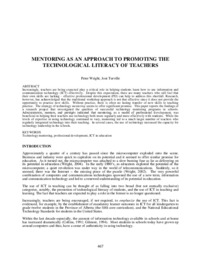Mentoring as an approach to promoting the technological literacy of teachers
Abstract
Increasingly, teachers are being expected play a critical role in helping students learn how to use information and communication technology (ICT) effectively. Despite this expectation, there are many teachers who still feel that their own skills are lacking - effective professional development (PD) can help to address this shortfall. Research, however, has acknowledged that the traditional workshop approach is not that effective since it does not provide the opportunity to practice new skills. Without practice, there is often no lasting transfer of new skills to teaching practice. The strategy of technology mentoring seems to offer significant promise. This paper reports the findings of a research project that investigated the qualities of successful technology mentoring programs in schools. Administrators, mentors, and protégés indicated that mentoring, as a model of professional development, was beneficial in helping their teachers use technology both more regularly and more effectively with students. While the levels of expertise in using technology continued to vary, mentoring led to a much larger number of teachers who regularly integrated technology into their teaching. In several cases, the use of technology increased the capacity for technology leadership in the schools.
